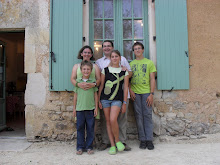There were a few differences between the French and British systems:
1) Stodge or salad? French children eat a proper lunch every day, and I mean proper, with a starter of fresh salad followed by a restaurant-style tempting main course, such as chicken with creamy mushroom sauce, la puree de pomme de terre (a kind of smooth mashed potatoes) and green beans, and a dessert of alternating fruit or light sweet such as yoghurt, compote, or ice-cream. Sometimes they would have a slice of camembert cheese and French bread. Parents even had a testing rota, to check all was well and volunteers would man the canteen. This was in stark contrast to the school dinners in England where Marc ate ‘pasta, rice and chips with gravy’ almost every day with a stodgy pudding with custard. In England they let children from age five choose their lunch, which seemed to be asking for trouble. The French put an airplane-style tray in front of the kids who were sat at the table. When I asked why Marc didn’t choose any vegetables in England he said that the lady never asked him, and that all his friends thought green things were yucky anyway. Many kids in England take sandwiches (at least you know what your kid eats) but this was not even an option at the KL Lycee.
2) What we did this week: The lycee sent home all the work done in the week on Fridays, to be signed by the parents. At first I found this heavy book bag day annoying at first, and since I didn’t understand the work done it wasn’t much help to me. Eventually I could acknowledge the fact that you could at least be aware of your child’s horrific spelling or maths before the school report. In England we only knew that Marc has never got more than 50% in a spelling test in Year 2 until we had a Parent-teacher conference. There was a simple grading system - tb (trés-bien or very good), b (bien or good) or ab (assez-bien or just good enough) and the mysterious vu, which I translated as ‘seen’ but apparently means ‘ok’. However we did not count for fun, because not enough tbs or b meant trouble or potentially re-double and so we must be vigilant. A missed accent or a badly-written sentence were punished. The grading was taken very seriously and there was none of the generous ‘he tried hard’ marks that we might have scored in England.
3) Parent contribution: There seemed to be very little parent-initiated fund-raising, as opposed to England where they were always trying to update the playing fields, or buy books for the library or suchlike. There were the official PTA members, of course, and they reported by email the ins and outs of the school board. Here in KL we didn’t have to organize a Christmas Craft Fair or bring a bottle for the raffle or drop off second-hand toys for the stalls. But even though we saved on direct fund-raising we had to pay for the yearly supply of paper, files, pens, pencils etc and even the class set-texts. So although I might have saved on tombola tickets I lost out buying trendy stationary and endless pencil sharpeners and felt-tipped pens.
4) Greetings! You must always ‘bonjour’ and ‘au revoir’ all the teachers, staff and fellow mothers as you cross paths. I mistakenly saw this as friendliness, it was not - it was just etiquette. You should kiss (twice on each cheek) a mother or teacher you knew socially too. Once you knew the teacher well you could tentatively use the informal ‘tu’ and their first name, but formality was a safer option. In England I usually only talked to the teacher and staff if I had too, although most staff would say a cheerful ‘hello’ and ‘goodbye’ as we dropped or picked up kids. The English tradition of small-talk on the lines of ‘Bad traffic jam today/terrible weather/how’s the car…’ with other mothers and teachers was not important. It went straight over the French mamans head, even worse they found it shallow and boring.
So with this insider knowledge of the two education systems I strangely felt proud and dissatisfied with the both French and English schools at the same time. Whereas one offered a delicious lunch, the other had stationary in the classroom, one you had to say hello, the other you talked about the weather. On some days I delighted in the French way of dong things, other days I was exasperated as I signed off every page of the weeks work or tried, without success, to engage my fellow mothers in conversation. In the end, I learnt to stop moaning about the monsoon weather or heavy books, and try to discuss the pros and cons of the French class/teacher/teaching style/comments in the class-book and compare it to the UK. When done well this would earn me the right to more than a morning ‘bonjour’…. and a step in the right direction to find a few French friends.
Subscribe to:
Post Comments (Atom)



No comments:
Post a Comment